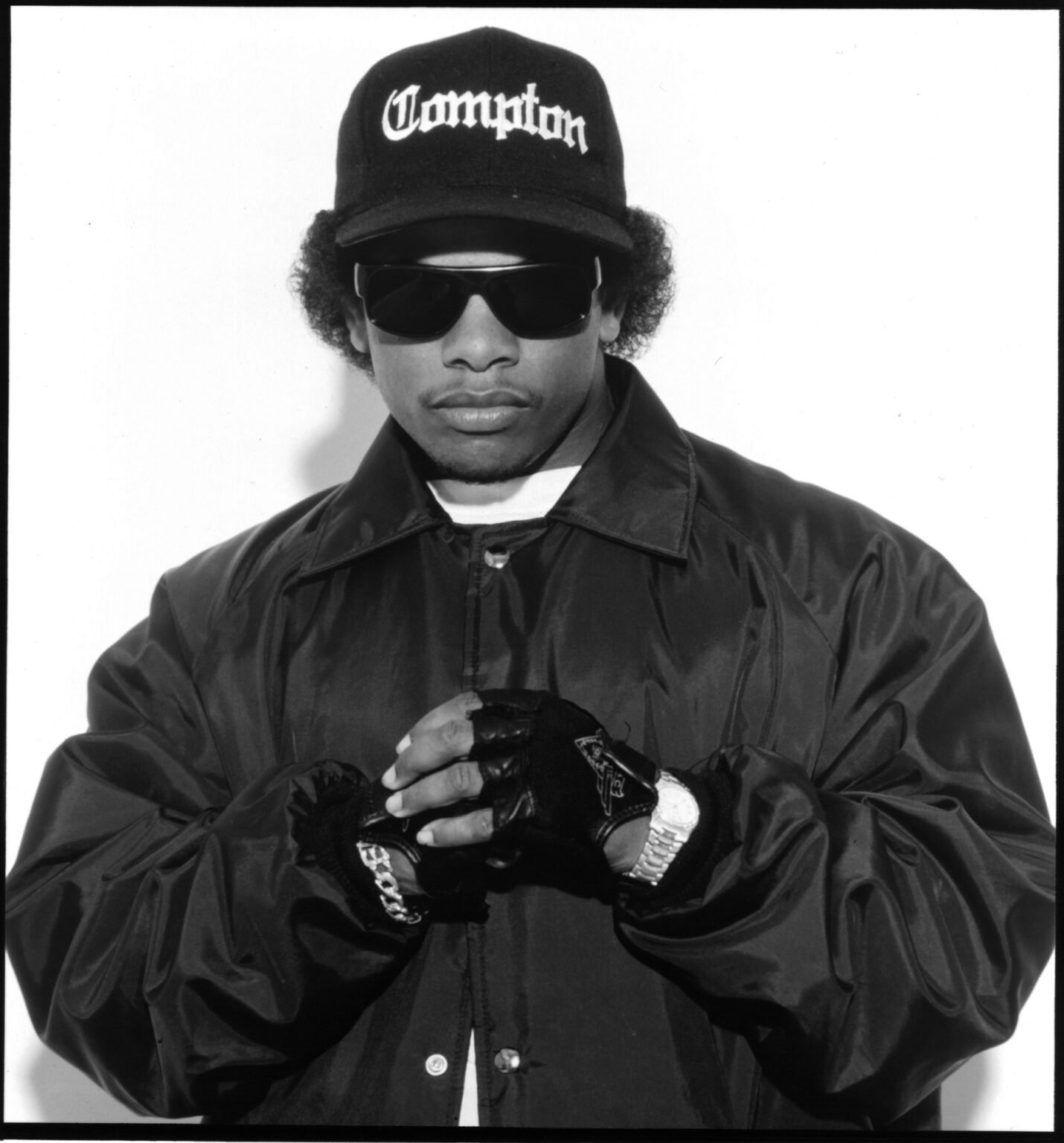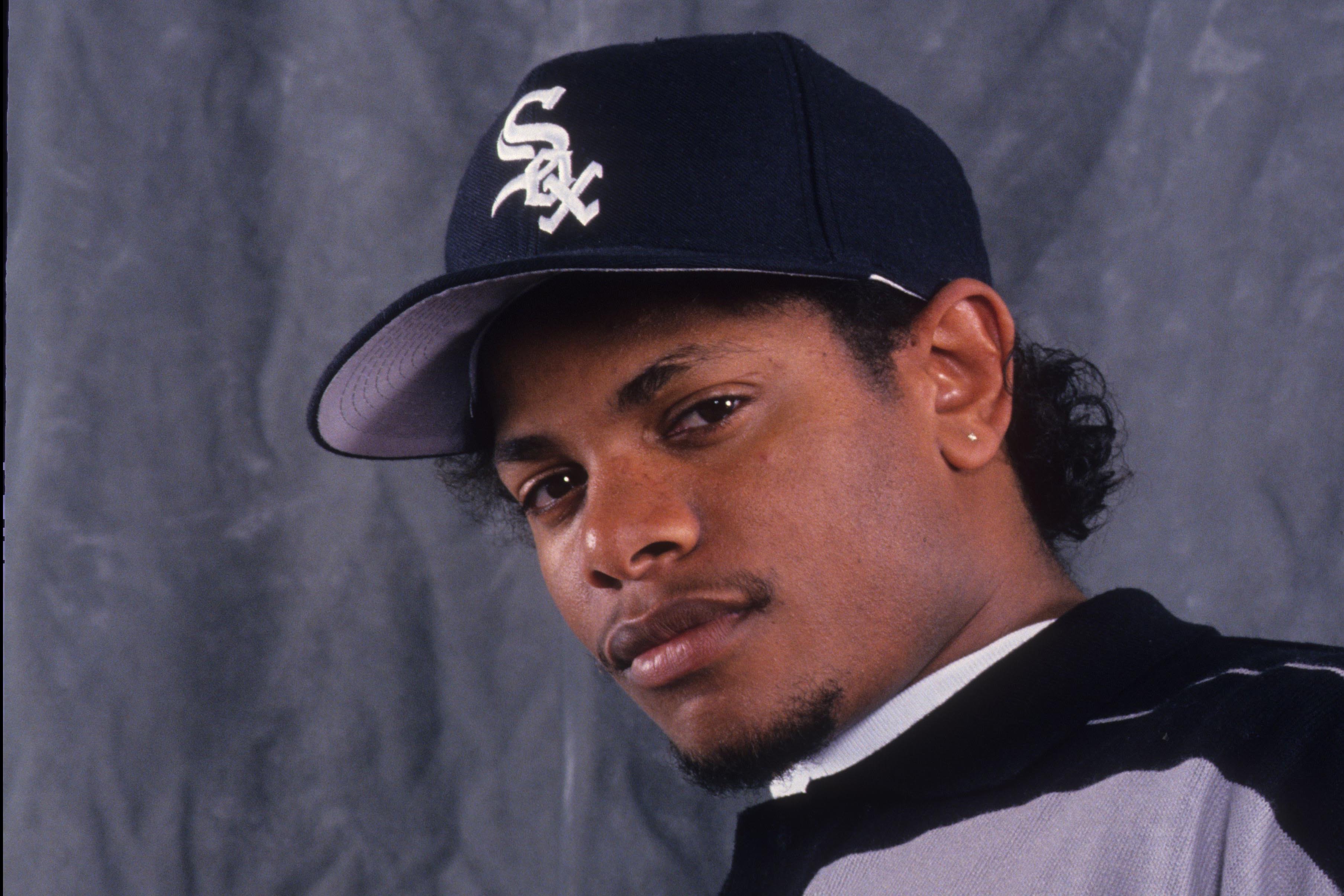Who is Eazy-E? The Godfather of Gangsta Rap, Eazy-E, was an American rapper, songwriter, record producer, and entrepreneur who is widely recognized as one of the most influential figures in the history of hip hop.
Born Eric Lynn Wright in Compton, California in 1964, Eazy-E rose to fame in the late 1980s as a member of the groundbreaking rap group N.W.A. Along with fellow members Dr. Dre, Ice Cube, MC Ren, and DJ Yella, N.W.A. pioneered the subgenre of gangsta rap and brought the often-violent and harsh realities of life in South Central Los Angeles to the forefront of popular music. Eazy-E's distinctive voice, charismatic stage presence, and ability to craft catchy, provocative lyrics made him a standout within the group.
In 1987, Eazy-E founded Ruthless Records, which became one of the most successful independent record labels in hip hop history. Through Ruthless, Eazy-E released his solo debut album, "Eazy-Duz-It," in 1988, which went double platinum. The album featured the hit singles "Boyz-n-the-Hood" and "We Want Eazy," which became anthems for the burgeoning gangsta rap scene.
Eazy-E continued to release successful solo albums throughout the late 1980s and early 1990s, including "Eazy-Eazy" (1989), "Str8 off tha Streetz of Muthaphukkin Compton" (1991), and "It's On (Dr. Dre) 187um Killa" (1993). He also collaborated with numerous other artists, including Snoop Dogg, Tupac Shakur, and Bone Thugs-n-Harmony.
Eazy-E's influence on hip hop cannot be overstated. He helped to popularize gangsta rap and bring the voices of marginalized communities to the mainstream. His music and lyrics addressed social issues such as poverty, racism, and violence, and he became a role model for many young people who identified with his experiences.
Unfortunately, Eazy-E's life was cut short in 1995 when he died at the age of 31 from complications of AIDS. Despite his untimely death, his legacy continues to live on through his music and the impact he had on the hip hop world.
- Paul Walkers Brother In Fast Furious 7 A Look At Cody
- Meet The Iconic Peanuts Characters Charlie Brown Friends
Eazy-E
Eazy-E, born Eric Lynn Wright, was a pioneering figure in the gangsta rap subgenre and co-founder of the influential group N.W.A. His impact on hip hop culture and the music industry remains significant.
- Gangsta Rap Pioneer: Eazy-E's raw and explicit lyrics, combined with his aggressive delivery, helped define the emerging gangsta rap genre.
- N.W.A. Co-Founder: As a founding member of N.W.A., Eazy-E played a crucial role in the group's success and the popularization of gangsta rap.
- Ruthless Records Founder: Eazy-E established Ruthless Records, which became a successful independent label and launched the careers of several notable hip hop artists.
- Cultural Icon: Eazy-E's music and persona resonated with marginalized communities, making him a cultural icon and role model.
- Tragic Death: Eazy-E's untimely death at the age of 31 from AIDS complications left a profound impact on the hip hop world.
Eazy-E's contributions to hip hop extended beyond his music. He helped to break down racial barriers in the industry and paved the way for other artists to express their experiences and perspectives. His legacy as a pioneer and cultural icon continues to inspire and influence generations of hip hop artists and fans.
| Born | Died | Occupation | Years active | Genres | Labels |
|---|---|---|---|---|---|
| April 7, 1964 | March 26, 1995 | Rapper, songwriter, record producer, entrepreneur | 1986-1995 | Gangsta rap, hip hop | Ruthless Records, Priority Records |
Gangsta Rap Pioneer
Eazy-E played a pivotal role in the development and popularization of gangsta rap, a subgenre of hip hop that emerged in the late 1980s and early 1990s. His raw and explicit lyrics, combined with his aggressive delivery, were key elements in shaping the sound and style of gangsta rap.
Eazy-E's lyrics often depicted the harsh realities of life in South Central Los Angeles, including violence, poverty, and drug abuse. He used his music to express the anger and frustration felt by many young people in marginalized communities. His lyrics were often controversial and criticized for their explicit language and content, but they also resonated with a large audience who identified with his experiences.
Eazy-E's aggressive delivery added to the impact of his lyrics. He rapped with a confrontational and in-your-face style that demanded attention. His unique vocal style, combined with his powerful lyrics, helped to define the sound of gangsta rap and set him apart from other rappers of the time.
Eazy-E's contributions to gangsta rap were significant. He helped to popularize the genre and bring it to a mainstream audience. His music helped to break down racial barriers in the music industry and paved the way for other artists to express their experiences and perspectives.
N.W.A. Co-Founder
Eazy-E's involvement in N.W.A. was essential to the group's success and the popularization of gangsta rap. As a founding member, Eazy-E brought his unique style, charisma, and business acumen to the group. His financial investment and entrepreneurial spirit helped to establish N.W.A. as an independent force in the music industry.
Eazy-E's leadership and vision were instrumental in shaping N.W.A.'s sound and image. He encouraged the group members to embrace their experiences and express their perspectives on life in South Central Los Angeles. His guidance and support helped to create a cohesive and dynamic group that resonated with a wide audience.
Eazy-E's contributions to N.W.A. extended beyond his role as a rapper. He also served as the group's manager and producer, handling the business and creative aspects of the group. His ability to negotiate contracts and secure distribution deals was crucial to N.W.A.'s commercial success.
Eazy-E's role as a co-founder of N.W.A. was pivotal in the development of gangsta rap. His leadership, vision, and business skills helped to establish the group as a groundbreaking force in hip hop. N.W.A.'s success paved the way for other gangsta rap artists and helped to bring the genre to a mainstream audience.
Ruthless Records Founder
Eazy-E's establishment of Ruthless Records was a pivotal moment in his career and in the history of hip hop. Ruthless Records became a successful independent label that launched the careers of several notable hip hop artists and played a significant role in the development of gangsta rap.
- Platform for Gangsta Rap: Ruthless Records provided a platform for Eazy-E and other gangsta rap artists to express their experiences and perspectives. The label's music often depicted the harsh realities of life in South Central Los Angeles, including violence, poverty, and drug abuse.
- Business Acumen: Eazy-E's business acumen was instrumental in the success of Ruthless Records. He negotiated favorable contracts and distribution deals that allowed the label to remain independent and control its own creative output.
- Artist Development: Ruthless Records played a crucial role in the development of several notable hip hop artists, including Dr. Dre, Snoop Dogg, and Bone Thugs-n-Harmony. Eazy-E provided these artists with mentorship, guidance, and opportunities to showcase their talents.
- Cultural Impact: Ruthless Records had a significant cultural impact, helping to popularize gangsta rap and bring the voices of marginalized communities to a mainstream audience. The label's music resonated with young people who identified with the experiences and perspectives expressed in its songs.
Eazy-E's founding of Ruthless Records was a major contribution to hip hop. The label provided a platform for gangsta rap artists to express themselves, launched the careers of several notable hip hop artists, and had a significant cultural impact.
Cultural Icon
Eazy-E's music and persona resonated deeply with marginalized communities, particularly young people in urban areas who identified with his experiences and perspectives. He became a cultural icon and role model for those who felt voiceless and disenfranchised.
- Voice for the Voiceless: Eazy-E's music gave a voice to the experiences and struggles of marginalized communities. His lyrics addressed issues such as poverty, racism, and violence, which many young people in these communities faced daily.
- Cultural Identity: Eazy-E's music and persona helped to shape a sense of cultural identity for many young people in marginalized communities. His music celebrated their experiences and provided a sense of belonging and empowerment.
- Role Model: Eazy-E became a role model for many young people who saw him as someone who had overcome adversity and achieved success. His music and persona inspired them to believe in themselves and pursue their dreams.
- Social Activism: Eazy-E's music also had a social activist element. His lyrics often spoke out against injustice and inequality, and he used his platform to raise awareness of important social issues.
Eazy-E's status as a cultural icon and role model extended beyond the music industry. He was a symbol of empowerment and resilience for marginalized communities, and his legacy continues to inspire and motivate young people today.
Tragic Death
Eazy-E's untimely death was a major loss for the hip hop community and had a significant impact on the genre's development and trajectory.
- Interruption of a Promising Career: Eazy-E's death cut short a promising and influential career. He was at the height of his success when he was diagnosed with AIDS, and his death left a void in the hip hop community.
- Increased Awareness of AIDS: Eazy-E's death brought increased awareness of AIDS to the forefront of public consciousness. His diagnosis and subsequent death helped to destigmatize the disease and encouraged people to get tested and seek treatment.
- Impact on N.W.A.: Eazy-E's death had a significant impact on N.W.A., the group he co-founded and led. The group disbanded shortly after his death, and the remaining members went on to pursue solo careers.
- Legacy and Influence: Despite his untimely death, Eazy-E's legacy and influence continue to be felt in the hip hop world. His music and persona continue to inspire and motivate artists and fans alike.
Eazy-E's tragic death was a reminder of the fragility of life and the importance of living each day to the fullest. His legacy as a pioneer of gangsta rap and a cultural icon continues to inspire and influence generations of hip hop artists and fans.
Frequently Asked Questions about Eazy-E
The following are some frequently asked questions about Eazy-E, an influential figure in the hip hop community:
Question 1: What was Eazy-E's real name?
Eazy-E's real name was Eric Lynn Wright.
Question 2: What was Eazy-E's role in the group N.W.A.?
Eazy-E was a founding member and the leader of the pioneering gangsta rap group N.W.A.
Question 3: What was the name of Eazy-E's record label?
Eazy-E founded the successful independent record label Ruthless Records.
Question 4: What was the cause of Eazy-E's death?
Eazy-E died in 1995 at the age of 31 from complications of AIDS.
Question 5: What was Eazy-E's legacy?
Eazy-E is remembered as a pioneer of gangsta rap and a cultural icon whose music and persona continue to inspire and influence artists and fans alike.
Conclusion
Eazy-E's contributions to hip hop culture are undeniable. As a pioneer of gangsta rap and a co-founder of N.W.A., he played a pivotal role in shaping the sound and style of the genre. His music gave a voice to marginalized communities and resonated with young people who identified with his experiences and perspectives.
Eazy-E's untimely death was a tragic loss, but his legacy continues to inspire and influence generations of hip hop artists and fans. His music remains a testament to his talent, his passion, and his commitment to expressing the realities of life in South Central Los Angeles.


